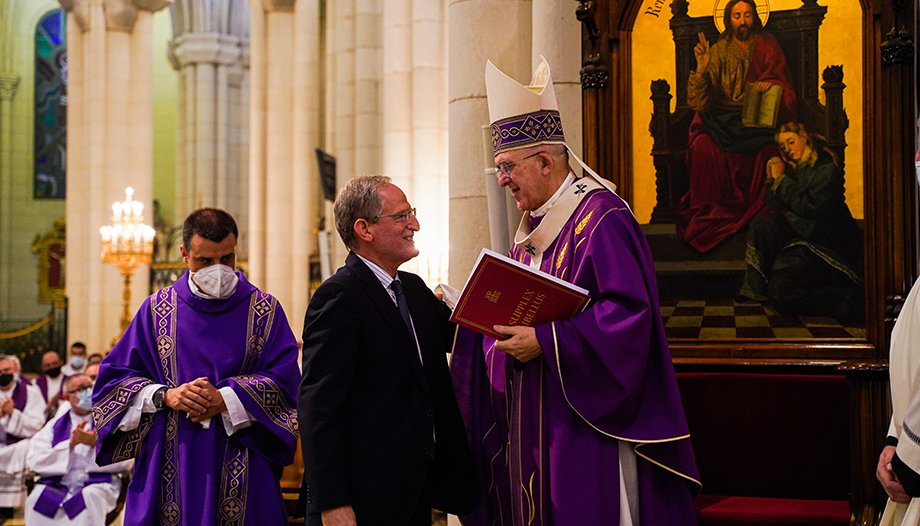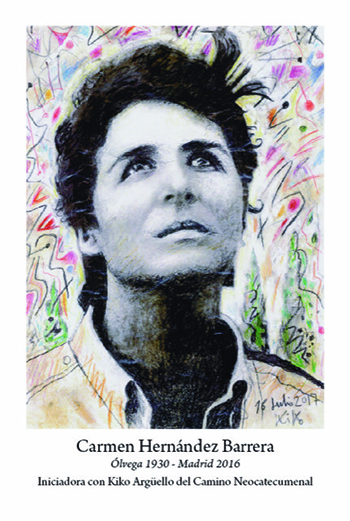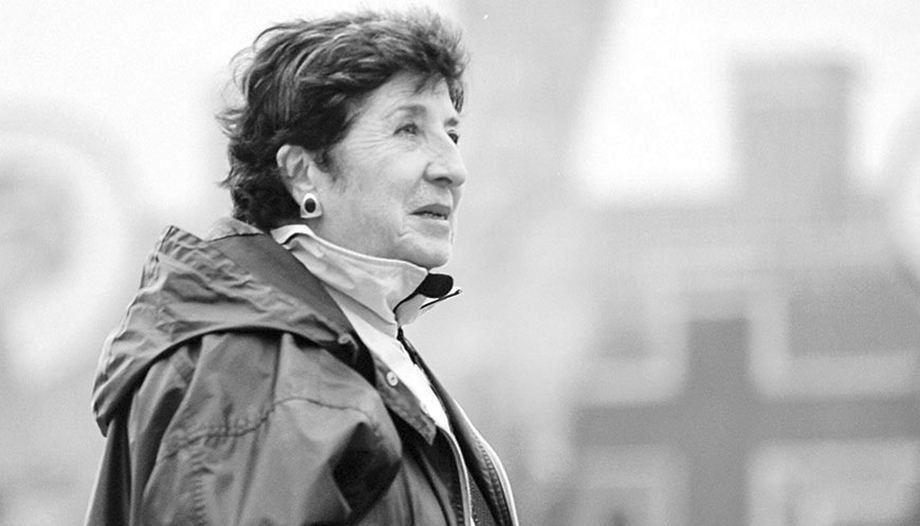Six years ago Carmen Hernandez, initiator, together with Kiko Arguello, of the Neocatechumenal Way, died in Madrid. Five years that, following the current canonical norms, make possible the request for the opening of the Cause of Beatification of a woman "deeply in love with Christ, as described in this interview with Omnes, Carlos Metola, diocesan postulator appointed by the Neocatechumenal Way.
Just two months ago, at the end of the Mass on the occasion of the fifth anniversary of Carmen's death, you gave Cardinal Osoro the libellus of demand, in which you formally requested the beginning of Carmen's cause of beatification. During this time, how has the process of gathering the necessary documentation for this cause been?
- When Carmen died in 2016 I started, together with some collaborators, to collect all the documentation she had generated throughout her life: her writings, letters she had written -of which she made a kind of draft- and other letters she received and that we have recovered.
Carmen wrote a lot. For her catecheses, for example, she prepared drafts well in advance, with many books and notes. Carmen and Kiko have preached the Gospel mainly orally, in retreats, meetings... thanks to God, all this has been recorded and it has been possible to transcribe their words.
All this written documentation has been sub-divided into topics that, from now on, will be studied by the historical commission and the theological censors of the Archdiocese of Madrid.
We have also collected the testimonies of her fame of sanctity and her fame of signs: those signs of Carmen's capacity of intercession in heaven. The graces and favors of these years exceed 1700. We have favors of all kinds: from passing an exam, or that an operation goes well to others that show a help or grace of God through Carmen's intercession that borders on the extraordinary.
We have realized that in many parts of the world there is a fumus, a conviction that Carmen lived her life in holiness: during her life, just before her death and after her death. Documentation of all this has been collected. Also from the visits to Carmen's tomb, where more than 35,000 people have already visited, most of them from the Neocatechumenal Way, but also many other people who have come to her tomb after learning about Carmen and her life.

One of the tasks of the postulators is to get into "the soul" of the people they want to elevate to the altars. You have known Carmen in life, but what Carmen did you know through her writings or testimonies that you did not know?
-Carmen wrote every day of her life. She kept diaries for more than thirty years. Each day she would write a short summary of the day. What we have found in these writings is an immense love for Jesus Christ. Every day she has notes such as "Lord, how good it is that we are alone", "Lord I love you", "Lord help me"....
Carmen has gone through many moments of suffering and struggle, because it is not easy to start. The Lord raised up the Neocatechumenal Way as a Christian initiation. Let me explain: for many centuries people entered the Church as children, but when they reached the age of adolescence or adulthood, the faith that was lived became small in the face of affective, sexual, economic and competitive problems, and there arose the doubt: where is the faith, why has the Baptism received not become a big tree full of fruit? Well, because it is necessary that the seed of faith received be watered and grow. And this is what Carmen and Kiko have done: to begin a Christian initiation.
Carmen realized that the Lord had placed in her hands a marvelous instrument for her faith to mature and grow to the stature of Christ. She did not want to create a congregation or a movement, she wanted to renew the Church, the parishes. All this she reflected in her diaries.
Carmen realized that the Eucharist and Reconciliation are fundamental sacraments, because they accompany us in our Christian life. She studied both sacraments for years, down to their roots. In these notes she reflects, for example, the need to rediscover the richness of our Baptism, the richness of the sacraments and the Word of God.
Many times in the meetings it was Kiko who spoke, but what Kiko said he had prepared together with Carmen. She had prepared it, they had discussed it. Kiko himself points out that Carmen was the soul of the Neocatechumenal Way, without her, the Way would not have been possible.
Carmen reflects in her writings a love for Christ, which makes her heroically be in the rearguard, in the back, and also a great love for the Church, for the Pope and a concern for what she called the lost sheep: those people who, within their Neocatechumenal communities, are going through a difficult situation, of special suffering....
Reading Carmen's notes reflects this: a great and intimate love for Christ, for the Church and for others.
Curiously, on days when, for example, there had been a multitudinous meeting with young people, in his notes we find that yes, he thanks the Lord for that meeting, but he immediately returns to his intimacy with Christ, "Lord, I love you, help me, do not let me fall...".
Many times Carmen went through what we could call "dark nights", a kind of feeling that the Lord "was leaving her", which is the struggle of those who proclaim the Gospel. In her notes, on many occasions she speaks to God in this way, asking him to stay with her, as one in love with Christ.
You have pointed out that Kiko, initiator of the Neocatechumenal Way, has described Carmen as the soul. The soul "cannot be seen" but without it there is no life?
- Yes. Indeed, there is an aspect of holiness that is external. Not because one glories in it, but because it is noticeable. Those of us who knew Carmen saw her holiness: when she prayed, spoke or asked us questions. But there is another hidden aspect. In the letter to the Colossians, St. Paul says "your life is with Christ hidden in God. That is to say, there is an aspect of holiness hidden in Christ. You cannot be holy if you do not have a serious and deep relationship with Christ.
Carmen prayed the hours of the Psalter and she really prayed them slowly, and she taught us all this: that a Christian cannot begin "quickly", but that it is a process. You have to face the Lord, because God's love changes the way we see life. Carmen had a great love for the Scriptures, she underlined them, she had marked passages... she knew them and always found something new in the Word of God. She had that hidden life in God, and that is what I, as postulator, have to demonstrate, that apart from the human and known side, there is a hidden part: that silent and constant dialogue with God that every Christian must have and that Carmen lived.
The expected opening of the Cause of Beatification of Carmen is the first person of this ecclesial reality who can be publicly declared a saint. How are you living this process in the Camino?

-For the Way this is new. It is true that there is the cause of Marta Obregón, which has concluded its diocesan phase and the documentation is in Rome, but in that case it is by way of martyrdom, because she died for defending her chastity. In the case of Carmen, the way by which the opening of the Cause is requested is the life, virtues and fame of sanctity. We are receiving a lot of help, for example, from the Delegate for the Causes of Saints in Madrid, Father Alberto Fernandez.
There are several things that help and encourage us: to see that favors and graces are coming from all over the world and, of course, to know in depth those writings that, until now, we had somewhat scattered and that, together, form something very serious, historical: Carmen's deep faith, which is an example for all.









